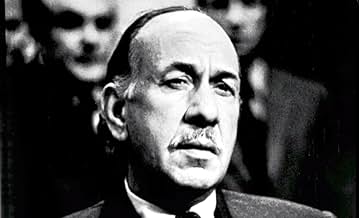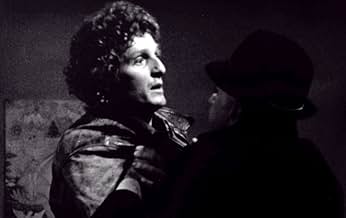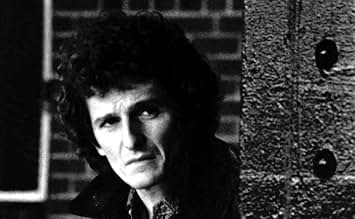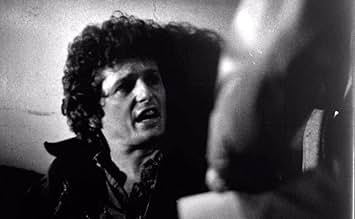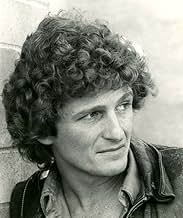IMDb-BEWERTUNG
7,7/10
732
IHRE BEWERTUNG
Füge eine Handlung in deiner Sprache hinzuA homicide detective begins to suspect that the black teenager accused of murdering two white girls is being framed by his fellow detectives.A homicide detective begins to suspect that the black teenager accused of murdering two white girls is being framed by his fellow detectives.A homicide detective begins to suspect that the black teenager accused of murdering two white girls is being framed by his fellow detectives.
- 2 Primetime Emmys gewonnen
- 3 Gewinne & 4 Nominierungen insgesamt
José Ferrer
- Jake Weinhaus
- (as Jose Ferrer)
Empfohlene Bewertungen
Effectively the pilot for the long running TV detective series 'Kojak", this TV movie is actually far more than that, being a dramatisation (with names changed) of an important case in American legal history, in establishing the rights of a defendant to have their legal rights read to them before answering questions relating to the offence.
Not that it helped the young unemployed black victim here, subject to a monstrous miscarriage of justice which sees him charged with three murders and an attempted rape he patently didn't do, who ended up serving time despite the efforts of in particular Kojak (a composite of the actual officers who bravely stood up for the accused) and an experienced defence attorney played by Jose Ferrer after the original court appointee (played by Robert Walden, later Joe Rossi in "Lou Grant") palpably fails him.
The direction eschews showiness and documents with fly-on-the-wall realism, the seamy methods of a so-called respected police force to pin a crime on the first donkey who comes along.
Fans of the TV series will be surprised to see none of the excellent supporting cast which made the show such a success in the 70's, like Dan Frazer and Kevin Dobson, although Telly's brother George, later the hang-dog Stavros gets a bit part as a newspaper reporter. Kojak himself isn't the finished article either as we see him act in ways he never would later on, such as violently losing his temper with a suspect, getting up close and personal with a past lover and even just working as a lone wolf much of the time. Savalas himself is excellent, already displaying the intensity of his character in his fine Italian clothes, although at this stage in his development catch-phrase and lollipop-less.
I read up on the "Career Girls" murders case which begot this drama and commend the makers for staying true to the story and bringing to light an unacceptable weakness in US justice. The fact that it led to a TV series as good as any to ever come of American television was just a bonus, albeit a very good one.
Not that it helped the young unemployed black victim here, subject to a monstrous miscarriage of justice which sees him charged with three murders and an attempted rape he patently didn't do, who ended up serving time despite the efforts of in particular Kojak (a composite of the actual officers who bravely stood up for the accused) and an experienced defence attorney played by Jose Ferrer after the original court appointee (played by Robert Walden, later Joe Rossi in "Lou Grant") palpably fails him.
The direction eschews showiness and documents with fly-on-the-wall realism, the seamy methods of a so-called respected police force to pin a crime on the first donkey who comes along.
Fans of the TV series will be surprised to see none of the excellent supporting cast which made the show such a success in the 70's, like Dan Frazer and Kevin Dobson, although Telly's brother George, later the hang-dog Stavros gets a bit part as a newspaper reporter. Kojak himself isn't the finished article either as we see him act in ways he never would later on, such as violently losing his temper with a suspect, getting up close and personal with a past lover and even just working as a lone wolf much of the time. Savalas himself is excellent, already displaying the intensity of his character in his fine Italian clothes, although at this stage in his development catch-phrase and lollipop-less.
I read up on the "Career Girls" murders case which begot this drama and commend the makers for staying true to the story and bringing to light an unacceptable weakness in US justice. The fact that it led to a TV series as good as any to ever come of American television was just a bonus, albeit a very good one.
"The Marcus-Nelson Murders" is a made for TV movie set in the summer of 1963 that turned out to be the pilot for "Kojak". It's based on a real case, 'The Career Girl Murders' of Emily Hoffert and Janice Wylie, though names and a few other details have been changed. The film details the investigation as well as the misconduct by the New York Police Department, as the accused was denied his rights to an attorney and was forced into confessing for a crime he did not commit. This is a fact, as the real killer was eventually caught and later confessed to the crime...though the falsely accused man was also sent to prison for several years! The injustice of the case helped lead to the landmark Miranda Decision in 1966.
The story begins with two young women being attacked and viciously murdered by a psycho with a knife. One was also raped.
You never see who he is and the film shows the case from the standpoint of the police department...as well as from the investigator, Lieutenant Kojack (the name was changed to 'Kojak' for the TV series). Over time, he starts to wonder if the confession was infact coerced and if the young man is being victimized. Naturally, the Department is not thrilled with Kojack's actions and they just want him to just drop his inquiry...especially the prosecutor.
If you are expecting something like "Kojak", you'll probably be disappointed. Aside from Telly Savalas and a brief scene where George Savalas plays a reporter, the cast is entirely different from the TV show. This isn't good nor bad...it's just different. And, it's generally a very good film. My only quibble is a very small one...everything looks like 1973 instead of 1963...such as clothing and hairstyles.
By the way, this film came out the same year as "Serpico"...a true film about corruption within the New York Police Department.
The story begins with two young women being attacked and viciously murdered by a psycho with a knife. One was also raped.
You never see who he is and the film shows the case from the standpoint of the police department...as well as from the investigator, Lieutenant Kojack (the name was changed to 'Kojak' for the TV series). Over time, he starts to wonder if the confession was infact coerced and if the young man is being victimized. Naturally, the Department is not thrilled with Kojack's actions and they just want him to just drop his inquiry...especially the prosecutor.
If you are expecting something like "Kojak", you'll probably be disappointed. Aside from Telly Savalas and a brief scene where George Savalas plays a reporter, the cast is entirely different from the TV show. This isn't good nor bad...it's just different. And, it's generally a very good film. My only quibble is a very small one...everything looks like 1973 instead of 1963...such as clothing and hairstyles.
By the way, this film came out the same year as "Serpico"...a true film about corruption within the New York Police Department.
I love true stories, especially this one. Based on the book by author Selwyn Raab, (a New York Times reporter) "Justice in the Back Room". This film was intense and very close to the book. The main character Louis Humes was played by Gene Woodbury who played the part perfectly as a shy uneducated black kid that was unjustly accused of an attempted rape, a murder in Brooklyn and also implicated in a double homicide in Manhattan. The newspapers in 1963 dubbed this as the Career Girl Murders. The film calls it the Marcus Nelson murders. The story rubbed me the wrong way because at the end, the narration said Humes was still in jail. It also said the prosecutor was elected an assemblyman. I wanted to know about this and read the book. Humes(not his real name) was finally cleared but the NY police tried to pin a mugging charge against him when he was in south Jersey. He was cleared of that too. Kojak is a composite of Selwyn Raab and some police officers that care.
I agree with the other comment on this-I feel this is an excellent film and, when i voted for this film I noticed that many of the high votes were by people roughly the same age as me (18) who, like me, probably don't remember when this was originally shown- I feel this speaks volumes about how relevant and engaging this film remains after all these years... and don't get me wrong - I have hardly ever seen Kojak but this film as it stands on its own makes sense and is very good. I wont spoil the film but I'll just say that I also like how the film doesn't really have a definite answer and leaves the viewer to agree or disagree with the ending. I'd recommend buying this if you can as It's a good price these days but still a great film.
This generation of film makers are afraid to make something like this now. Distributors wont touch it.This should not have been a TV movie. Academy award worthy across the board here. The direction, the cinematography, one heck of a script, and you can take your pick of the actors whose performances went past the heart and right for the gut. The subject matter supporting the Kojak mythology puts the film right up there with any top civil rights documentary. I first saw it as the " The 3:30 movie" on channel seven in Chicago back in 74.I didn't know what I was looking at until I studied the King event. Abby Mann later wrote and directed "King" but this script is as close as you will get to a saturated gritty matter-of -fact telling of a story that still rightly embarrasses the legal system. I always wondered why the networks never bothered to show it again. I see why...and so will you.
WUSSTEST DU SCHON:
- WissenswertesThe film is based on an actual case known as the "Career Girl" murders that happened on 28 August 1963. It was the date on which Martin Luther King delivered his "I Have A Dream" speech, as mentioned in the film.
- PatzerWhen Lt. Theo Kojack drives to Lewis Humes's party, a camera shot inside his Ford Torino shows the car has a plastic, sport side-view mirror on the driver's door. When he arrives and parks to proceed to the party, the Torino now has a metal, square, chrome, side-view mirror on the driver's door.
- Zitate
Jake Weinhaus: That's a nice woman, Saul. She managed to say goodbye even though I told her I couldn't save her son.
- VerbindungenFeatured in The 25th Annual Primetime Emmy Awards (1973)
Top-Auswahl
Melde dich zum Bewerten an und greife auf die Watchlist für personalisierte Empfehlungen zu.
Details
- Erscheinungsdatum
- Herkunftsland
- Sprache
- Auch bekannt als
- Confeso por coacción
- Drehorte
- St Johns Pl and East New York Avenue, Brooklyn, New York City, New York, USA(Patrolman Stabile first finds Lewis Humes - north corner - then phones from police callbox - east corner of East New York Avenue and Strauss St.)
- Produktionsfirmen
- Weitere beteiligte Unternehmen bei IMDbPro anzeigen
- Laufzeit2 Stunden 5 Minuten
- Sound-Mix
- Seitenverhältnis
- 1.33 : 1
Zu dieser Seite beitragen
Bearbeitung vorschlagen oder fehlenden Inhalt hinzufügen

Oberste Lücke
By what name was Der Mordfall Marcus-Nelson (1973) officially released in India in English?
Antwort

